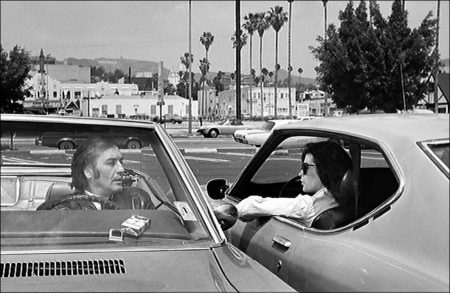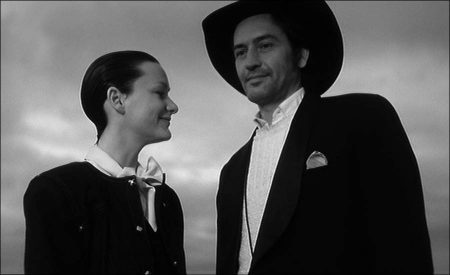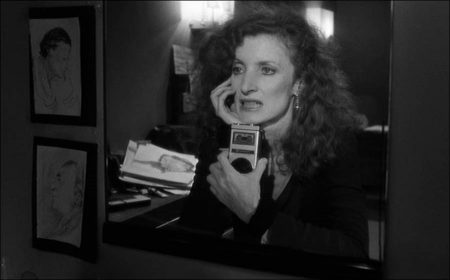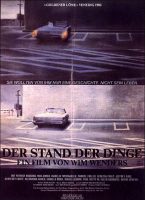Taglines: They didn’t want to kill him. They just wanted a story.
The State of Things movie storyline. A film crew is stranded in a melancholy seaside hotel somewhere outside of Lisbon when the production runs out of money mid-shoot. The director, Friedrich, is a gentle philosophical leader of intellect and heart who enjoys a paternal relationship with everyone in the cast and crew. He is a rock of calm in the midst of this crisis, keeping his charges fed and sheltered not only physically, but emotionally. He accomplishes this through maintaining the company’s focus on their art and humanity during the boring days they spend waiting for an infusion of cash to resume work.
His steadfast ally in this is the grizzled old cameraman Joe, whose vast experience in the business steadies him as a father can a son. As days stretch out with no word from their producer back in the USA, the people occupy themselves in the minutiae of forestalling the crushing boredom. They are becoming a family of sorts, forced to empathize and interact with each other more intimately than film crews normally do. It is the silver lining in this cloud of doubt enveloping them.
But as days become weeks, foreboding begins to overtake them. Joe must return home to bury his terminally-ill wife, reluctantly leaving Friedrich to manage the worsening situation alone. Dennis, the high-strung line producer/writer, begins to snap, despairing in what he calls the “suicide” of making films. When Friedrich attempts to assuage Dennis’ panic, pleading, “We’re in the same boat”, he replies, “No, YOU’RE in the boat — I’m on the ship.” Dennis, like many paranoids, is privy to knowledge others miss.
He knows many important facts that he’s withholding from Friedrich: like the elaborate data base he’s assembled which tabulates and illustrates every aspect of their project from storyboards and budget to biographies of all players … and most important, the fact that their producer has deserted them and there will be no more money. Friedrich can sense the unspoken betrayal though he cannot believe it. He realizes with alarm that drastic measures are necessary.
The State of Things (German: Der Stand der Dinge) is a 1982 film directed by Wim Wenders. It tells the story of a film crew stuck in Portugal after the production runs out of film stock and money. The director travels to Los Angeles in search of his missing producer.
Film Review for The State of Things
WIM WENDERS’S ”State of Things,” which was named the best film at last year’s Venice Film Festival, is a movie with a very romantic, very European sensibility, not about life, but about films and the people who make them. I feel that I must choose my words carefully here because, although it left me absolutely cold – frigid, really – I know it’s the kind of work that will be infinitely fascinating to film aficionados whose priorities I do not share.
On what surface it has, ”The State of Things” is about a small, international film crew – the director, the writer, the actors, the cameraman, and the set and lighting people – that has gathered outside Lisbon to shoot a low-budget science-fiction film based on Alan Dwan’s ”The Most Dangerous Man Alive” (1961). When ”The State of Things” starts, the producer of the film-within-the-film has fled back to Hollywood, supposedly to find money with which to complete the project.
For several days, the director, writer and actors loaf around their tacky seaside hotel, talking about life and movies, and particularly about whether movies should have stories. At this point, ”The State of Things” is all chat and no plot, but then someone says portentously, ”A life without stories isn’t worth living.”
Eventually the film’s director, played by Patrick Bauchau, returns to Hollywood to find the missing producer, played by Allen Goorwitz, at which point a melodramatic plot is in@troduced.
”The State of Things” reminds me a lot of Rainer Werner Fassbinder’s far more haphazard but far more fascinating ”Beware the Holy Whore.” Although there is obviously more to it than I am capable of going into – I’m afraid I’d fall asleep in the process – ”The State of Things” has some minor compensations. These include appearances by Viva, now billed as Viva Auder, doing pretty much what she used to do for Andy Warhol and Paul Morrissey; Sam Fuller, who plays the crochety, hard-drinking cameraman, and Roger Corman, the Hollywood producer-director, as a lawyer.
Though the screenplay was written by Mr. Wenders and Robert Kramer (”Ice,” ”Guns”), both of whom are men whose work I’ve admired in the past, much of the dialogue sounds to have been improvised. This is sometimes embarrassingly awful, such as in Mr. Goorwitz’s big scene at the end; and, infrequently, quite marvelous, as when Paul Getty 3d, who plays the writer of the film-within, talks at length about his terrible California childhood.
The State of Things (1983)
Directed by: Wim Wenders
Starring: Allen Garfield, Rebecca Pauly, Samuel Fuller, Isabelle Weingarten, Camila Mora-Scheihing, Patrick Bauchau, Jeffrey Kime, John Paul Getty, Roger Corman, Francisco Baião
Screenplay by: Robert Kramer, Wim Wenders, Joshua Wallace
Cinematography by: Henri Alekan, Fred Murphy, Martin Schäfer
Film Editing by: Jon Neuburger, Peter Przygodda, Barbara von Weitershausen
Costume Design by: Maria Gonzaga
Makeup Department: Maria Gonzaga
Music by: Jim Jarmusch, Jürgen Knieper
MPAA Rating: None.
Distributed by: Gray City (United States) Axiom Films (UK and Ireland)
Release Date: February 18, 1983
Visits: 111



